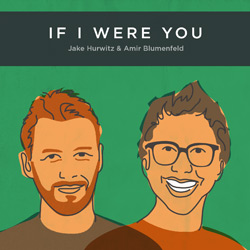Four score and seven years ago In 2001 our fathers Adam Curry and Dave Winer brought forth on this continent, a new form of media, conceived in easy accessibility, and dedicated to the proposition that all men can create audio files that can be quickly downloaded, streamed, or subscribed to – a phenomenon later to be known as “podcasting.”
In 2004 The Guardian published an article by journalist Ben Hammersley called “Audible Evolution”. Many people accredit him to the podcasting boom, but NEWSFLASH people!! podcasting was already a thing since 2001! Even in 2003, a year before Hammersley published his article, Curry and Winer organized Bloggercon, a convention held at Harvard University for the podcast community to unite and talk about podcast domination/things. 
So Hammersley was the first person to write about podcasting, and therefore is known as the guy who coined the term “podcasting”. So he promoted something that’s trendy… big deal. He didn’t even talk about the most important part of podcasting, aka syndication biznatches!!
Back to our forefathers – Dave Winer actually created RSS (Rich Site Summary/Really Simple Syndication) which allows people to subscribe to a podcast. Without Syndication there is no podcast, there’s just a bunch of audio files uploaded to a site. Thank you, Dave!!
SO, why did Hammersley (allegedly) call it podcasting? Legend has it that when Curry was in the midsts of creating the phenomena of listening to audio files on the go he had the iPod in mind. Pod + Broadcasting = Podcasting. But you don’t need to have an iPod to listen to stuff… you just don’t need to have an iPod if you wanna be a loser.
Other possible origins…
Pod (capsule) + Casting
Pod (Portable on Demand) + Casting
Pod (Poop on Deck) + Casting
Pod (Pleasant owls Daily) + Casting
Pod (Penis on Download)) Casting
Pod (Police our Dicks) Casting
To review what we learned: Ben Hammersley is a journalist who wrote about podcasting, Adam Curry invented how to get filed onto an mp3 device (I didn’t mention this earlier but you can do your own goddamn research this isn’t Wikipedia!!), and David Winer created the <enclosure> tag that allows people to subscribe to podcasts.
Like most American history, that was pretty boring, but necessary to know (I guess?). Myfavorite podcast/the only podcast I listen to is If I Were You Show, the only advice podcast hosted by Jake Hurwitz and Amir Blumenfeld. Before their podcast ranked #3 on iTunes, these two Jewish American BFFs wrote for College Humor and gained attention across Jewish day schools everywhere for their sketch series, Jake and Amir.  I binge listen to their podcast via Podcast Addict because I broke my iPhone during Abroadfest and had to replace it with a shitty android for the duration of my time in Barcelona. Despite my previous jab at non-iPhone users, I don’t actually have a problem with androids – just ones that are a piece of shit.
I binge listen to their podcast via Podcast Addict because I broke my iPhone during Abroadfest and had to replace it with a shitty android for the duration of my time in Barcelona. Despite my previous jab at non-iPhone users, I don’t actually have a problem with androids – just ones that are a piece of shit.
When you subscribe to Jake and Amir’s podcast they become your best guy friends and gurus for life. They’ll make you laugh so hard on your daily commute that you spill hot coffee all over your jeans, and they’ll give you tough love advice to help you get over that guy you used to bang whose number you constantly delete in the hopes of forgetting him but inevitably re-add anyway. 
I’ve always wanted to make a podcast, but I haven’t yet found the Jake to my Amir that can bounce off my conversation the way they do. Fortunately for me, but perhaps unfortunately for whoever listens, my teacher has required my class to create a podcast segment. However, if you were paying attention to the history of podcasting you’ll realize that my “podcast” isn’t actually a podcast, but rather an audio file I’ve uploaded. Why is that? Because there’s no RSS! 100 points to ME!
For the past seven years I’ve been the proud attendee of Camp Pocono Trails, otherwise known as “weight loss camp” to those too embarrassed to call it “fat camp”, or more famously known as MTV’s Fat Camp.
And for the past seven years I’ve also been bombarded with questions on what fat camp is really like. So for my podcast, I invite you to listen to Fat Camp Uncovered:

